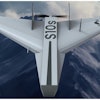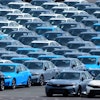
FRANKFURT, Germany (AP) — Automaker Renault is setting out ambitious goals for its new combined electric vehicle and software business, saying it will "democratize" the market for battery-powered cars in Europe by making them as affordable as gasoline- or diesel-powered models.
Combining electric vehicles and software in the new independent company Ampere will mean shorter development times and lower costs as the company faces tough competition from U.S.-based Tesla and Chinese carmakers who are making rapid progress.
The company envisions a "software-driven car" by 2026 based on an overarching software package that can be used for different electric car models and combines scattered processors in a central architecture that remains constantly connected to computer networks, or "the cloud." That will enable over the air software updates and customer retention for servicing the vehicle, the company said at an investor day presentation Wednesday. The result should be a 40% cost reduction in production costs by 2027—28 for the successor models to its Megane E-Tech and Scenic E-Tech.
All-electric models typically sell for more than gasoline- or diesel-powered equivalents, but the cost difference is expected to decline as battery technology improves.
The company also plans a small car selling for under 20,000 euros ($21,695).
Carving out electric cars and software will mean that technology and automotive engineers "will find a common language... and combine the best of tech and automotive," said CEO Luca de Meo during an investor day presentation.
He said Ampere would enable more independent decision making to respond to rapidly changing technology: "Those who stay light and agile, putting their people in a position to experiment and innovate, will come faster out of the curves," he said.
Renault is open to selling shares in Ampere, which was hived off on Nov. 1, through an initial public offering if conditions are right but says it will retain a majority stake. The company predicts Ampere will have revenue of 10 billion euros annually with four vehicles, reaching 25 billion euros in 2031 with seven vehicles.






















